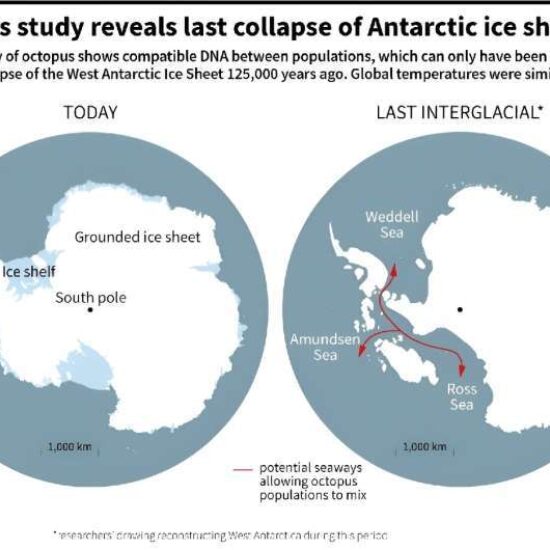Genomic evidence for West Antarctic Ice Sheet collapse during the Last Interglacial
Citation: Sally C. Y. Lau et al. ,Genomic evidence for West Antarctic Ice Sheet collapse during the Last Interglacial.Science382,1384-1389(2023).DOI:10.1126/science.ade0664
Plain English abstract
How the West Antarctic Ice Sheet (WAIS) responded to warmer climates in the geologic past has obvious relevance to our understanding of what its future could be as global temperatures rise due to human activities. Using genetic analyses of a type of circum-Antarctic octopus, Pareledone turqueti, Lau et al. showed that the WAIS collapsed completely during the last interglacial period, when global sea levels were 5 to 10 meters higher than today and global average temperatures were only about 1°C warmer (see the Perspective by Dutton and DeConto). The implication of this finding is that major WAIS collapse and the consequent rise in sea level could be caused even by the minimal temperature rises projected for stringent climate change mitigation.
Scientific abstract
The marine-based West Antarctic Ice Sheet (WAIS) is considered vulnerable to irreversible collapse under future climate trajectories, and its tipping point may lie within the mitigated warming scenarios of 1.5° to 2°C of the United Nations Paris Agreement. Knowledge of ice loss during similarly warm past climates could resolve this uncertainty, including the Last Interglacial when global sea levels were 5 to 10 meters higher than today and global average temperatures were 0.5° to 1.5°C warmer than preindustrial levels. Using a panel of genome-wide, single-nucleotide polymorphisms of a circum-Antarctic octopus, we show persistent, historic signals of gene flow only possible with complete WAIS collapse. Our results provide the first empirical evidence that the tipping point of WAIS loss could be reached even under stringent climate mitigation scenarios.

Stage of mission: Related research

